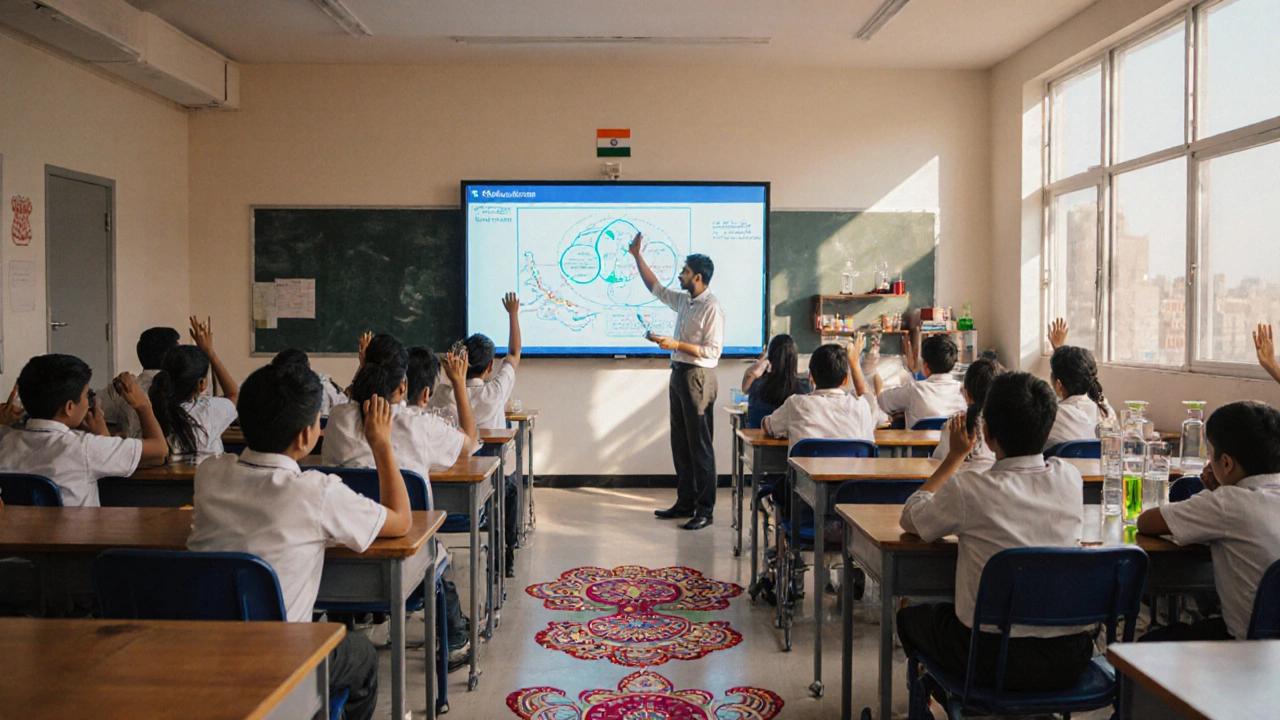CBSE School Finder
Find CBSE-Affiliated Schools
CBSE Schools in
Key Facts About CBSE Abroad
CBSE has over 2,600 affiliated schools worldwide across 30+ countries. The UAE has the highest concentration with 35% of global schools.
All schools follow the same curriculum as Indian CBSE schools, with minor adaptations for local holidays and language requirements.
Key Takeaways
- CBSE is an Indian board, but it affiliates schools in over 30 countries.
- The board’s curriculum is used by Indian diaspora schools and international institutions that adopt the Indian system.
- Affiliation abroad follows the same standards as Indian schools, with additional compliance for local regulations.
- CBSE competes globally with boards like IB and Cambridge, each offering distinct pathways.
- Students in CBSE schools overseas sit for the same board exams as those in India.
When you hear CBSE is a central board of secondary education in India that sets curriculum and conducts board exams for millions of students, the instinctive answer is “yes, it’s only Indian.” The reality is more nuanced. While the board’s headquarters sit in New Delhi, its affiliation network stretches across continents, serving Indian families, expatriates, and even local students who prefer an Indian‑style education.
What Exactly Is CBSE?
CBSE stands for the Central Board of Secondary Education. Established in 1962, it operates under the Ministry of Education and works closely with the National Council of Educational Research and Training (NCERT) to design a uniform syllabus for classes6‑12. The board’s core responsibilities include:
- Framing the CBSE syllabus for core subjects like Mathematics, Science, Social Studies, and Languages.
- Conducting the All India Senior School Certificate (AISSC) and All India Senior School Certificate Examination (AISSCE) for Class10 and Class12.
- Affiliating schools that meet its infrastructure, teacher‑qualification, and academic‑performance standards.
CBSE’s Footprint Inside India
Domestically, CBSE governs more than 21,000 schools and touches the lives of roughly 25million students. Its structure is decentralized through regional offices in Delhi, Kolkata, Chennai, and Hyderabad, each overseeing clusters of schools. The board’s popularity stems from a relatively moderate workload, a focus on analytical skills, and the credibility of its national examinations.
CBSE Schools Outside India: How Far Does the Network Reach?
The board’s overseas presence began in the early 1990s, when Indian expatriate communities in the Middle East and Southeast Asia sought an education that mirrored home. Today, CBSE affiliates schools in more than 30 countries, including the United Arab Emirates, Qatar, Saudi Arabia, Oman, Singapore, Malaysia, Kenya, Tanzania, the United Kingdom, the United States, Canada, and Australia.
Key statistics (as of 2024):
- ~2,600 CBSE‑affiliated schools operate outside India.
- The United Arab Emirates hosts the highest number of overseas CBSE schools, accounting for roughly 35% of the global total.
- In the United Kingdom and the United States, CBSE schools cater mainly to the Indian diaspora, but they also admit local students seeking a rigorous STEM‑focused curriculum.
These schools follow the exact same syllabus as their Indian counterparts, with occasional adaptations for local holidays or language requirements.

Affiliation Process for Schools Abroad
Any institution wanting to become a CBSE‑affiliated school abroad must navigate a three‑step process:
- Application Submission: The school sends a detailed proposal to the nearest CBSE regional office, outlining infrastructure, faculty qualifications, and student‑to‑teacher ratios.
- Inspection & Compliance: CBSE officials conduct an on‑site inspection (or a virtual audit when travel is impractical) to verify compliance with the board’s standards.
- Affiliation Grant: Upon successful inspection, the school receives an affiliation certificate, typically valid for three years, after which renewal is required.
Throughout this process, the board also ensures the school complies with the host country’s education regulations, such as curriculum approval from local ministries.
Curriculum Consistency: Teaching the Same Syllabus Worldwide
Whether a student sits in Bangalore or Dubai, the CBSE syllabus remains identical for core subjects. This uniformity offers several advantages:
- Mobility: Families that relocate can transfer students without major academic disruptions.
- Standardized Assessment: The same board exams (AISSC and AISSCE) are administered globally, ensuring comparable grading standards.
- College Eligibility: Indian universities and many overseas institutions recognize CBSE scores for admission.
Some overseas schools supplement the core syllabus with local language classes or elective courses to meet regional education requirements.
CBSE vs. Other International Boards
When parents compare options, three major international curricula often surface: CBSE, the International Baccalaureate (International Baccalaureate (IB)), and Cambridge Assessment International Education (Cambridge International). The table below highlights core differences.
| Attribute | CBSE | IB | Cambridge |
|---|---|---|---|
| Origin | India (1962) | Switzerland (1968) | UK (1858) |
| Primary Focus | Foundational knowledge, analytical skills | Holistic development, inquiry‑based learning | Subject depth, exam preparation |
| Assessment Style | Standardized board exams (Class10 & 12) | Internal assessments + final exams | IGCSE / A‑Levels exams |
| Global Recognition | Widely accepted in India, growing acceptance abroad | Universities worldwide | Universities worldwide |
| Cost per student (annual) | ₹8,000‑₹12,000 (≈$100‑$150) | $12,000‑$20,000 | $7,000‑$14,000 |
CBSE’s lower fee structure makes it attractive for expatriate families who want a cost‑effective yet rigorous education. However, IB and Cambridge often appeal to students aiming for universities in Europe or North America that value continuous assessment and broader extracurricular portfolios.

Benefits of Studying CBSE Abroad
- Continuity: Children of Indian professionals can maintain a consistent academic track, easing transitions back to India for higher education.
- Strong STEM Emphasis: The curriculum’s focus on mathematics and science prepares students for engineering and medical entrance exams.
- Affordability: Compared with other international boards, CBSE schools generally charge lower tuition.
- Cultural Connection: Schools often celebrate Indian festivals, offering a sense of community for diaspora families.
Challenges and Common Concerns
Despite its advantages, CBSE abroad isn’t without hurdles. Parents frequently ask:
- Local Accreditation: Some host countries require additional accreditation, which can increase administrative workload.
- Language Barriers: While English is the medium of instruction, students may need extra support in the local language for social integration.
- Limited Extracurricular Scope: Compared to IB’s mandated Creativity, Activity, Service (CAS) component, CBSE schools sometimes offer fewer structured extracurricular programs.
Most schools address these issues by partnering with local language tutors and offering clubs, sports, and community service projects.
Future Outlook: Will CBSE Expand Further?
Data from the Ministry of Education suggests a steady rise in overseas affiliations-about 8% year‑on‑year growth since 2020. The board is actively promoting digital learning platforms, which could make remote accreditation easier and attract schools in regions like Africa and Latin America.
In short, CBSE is far from being an India‑only phenomenon. Its global network continues to expand, driven by demand from the Indian diaspora and by the board’s reputation for affordable, academically rigorous schooling.
Frequently Asked Questions
Is the CBSE curriculum the same in foreign schools?
Yes. Overseas CBSE schools follow the identical syllabus designed by NCERT, with only minor adjustments for local holidays or language requirements.
Which countries have the most CBSE‑affiliated schools?
The United Arab Emirates leads, followed by Saudi Arabia, Qatar, Singapore, and the United Kingdom. Together they host over one‑third of all CBSE schools abroad.
Do CBSE board exams held abroad have the same difficulty as those in India?
Absolutely. The exam papers are prepared centrally and distributed globally, so grading standards and difficulty levels are identical.
Can a student transfer from a CBSE school abroad to an Indian board school without losing credits?
Yes. Since the curriculum is the same, most subjects map one‑to‑one, and students can continue without repeating courses.
How does CBSE handle local language requirements in non‑English‑speaking countries?
Schools typically add the host country’s language as an elective or second language, ensuring compliance with local education laws while keeping the core CBSE syllabus intact.

